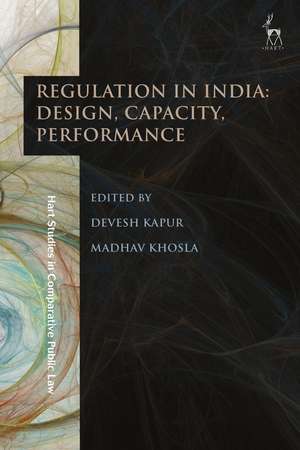Regulation in India: Design, Capacity, Performance: Hart Studies in Comparative Public Law
Editat de Professor Devesh Kapur, Dr Madhav Khoslaen Limba Engleză Hardback – 3 apr 2019
| Toate formatele și edițiile | Preț | Express |
|---|---|---|
| Paperback (1) | 349.13 lei 43-57 zile | |
| Bloomsbury Publishing – 18 noi 2020 | 349.13 lei 43-57 zile | |
| Hardback (1) | 779.50 lei 43-57 zile | |
| Bloomsbury Publishing – 3 apr 2019 | 779.50 lei 43-57 zile |
Din seria Hart Studies in Comparative Public Law
- 22%
 Preț: 270.67 lei
Preț: 270.67 lei - 18%
 Preț: 305.41 lei
Preț: 305.41 lei - 18%
 Preț: 323.38 lei
Preț: 323.38 lei -
 Preț: 380.87 lei
Preț: 380.87 lei - 23%
 Preț: 386.15 lei
Preț: 386.15 lei - 22%
 Preț: 251.39 lei
Preț: 251.39 lei - 27%
 Preț: 440.31 lei
Preț: 440.31 lei - 22%
 Preț: 227.81 lei
Preț: 227.81 lei - 22%
 Preț: 270.67 lei
Preț: 270.67 lei - 22%
 Preț: 273.42 lei
Preț: 273.42 lei - 27%
 Preț: 349.13 lei
Preț: 349.13 lei - 22%
 Preț: 272.51 lei
Preț: 272.51 lei - 22%
 Preț: 270.49 lei
Preț: 270.49 lei - 22%
 Preț: 226.42 lei
Preț: 226.42 lei - 23%
 Preț: 171.85 lei
Preț: 171.85 lei - 30%
 Preț: 576.15 lei
Preț: 576.15 lei - 30%
 Preț: 900.07 lei
Preț: 900.07 lei - 18%
 Preț: 380.74 lei
Preț: 380.74 lei - 21%
 Preț: 279.85 lei
Preț: 279.85 lei - 22%
 Preț: 251.75 lei
Preț: 251.75 lei - 17%
 Preț: 315.19 lei
Preț: 315.19 lei - 18%
 Preț: 321.78 lei
Preț: 321.78 lei - 21%
 Preț: 236.30 lei
Preț: 236.30 lei - 18%
 Preț: 321.78 lei
Preț: 321.78 lei - 30%
 Preț: 960.98 lei
Preț: 960.98 lei - 22%
 Preț: 271.94 lei
Preț: 271.94 lei - 22%
 Preț: 239.59 lei
Preț: 239.59 lei - 18%
 Preț: 322.15 lei
Preț: 322.15 lei - 22%
 Preț: 264.17 lei
Preț: 264.17 lei - 22%
 Preț: 264.57 lei
Preț: 264.57 lei
Preț: 779.50 lei
Preț vechi: 1116.27 lei
-30% Nou
Puncte Express: 1169
Preț estimativ în valută:
149.16€ • 156.13$ • 124.15£
149.16€ • 156.13$ • 124.15£
Carte tipărită la comandă
Livrare economică 31 martie-14 aprilie
Preluare comenzi: 021 569.72.76
Specificații
ISBN-13: 9781509927562
ISBN-10: 1509927565
Pagini: 456
Dimensiuni: 156 x 234 mm
Greutate: 0.84 kg
Editura: Bloomsbury Publishing
Colecția Hart Publishing
Seria Hart Studies in Comparative Public Law
Locul publicării:London, United Kingdom
ISBN-10: 1509927565
Pagini: 456
Dimensiuni: 156 x 234 mm
Greutate: 0.84 kg
Editura: Bloomsbury Publishing
Colecția Hart Publishing
Seria Hart Studies in Comparative Public Law
Locul publicării:London, United Kingdom
Caracteristici
Considers the form of regulation across different sectors and the character of regulation in practice
Notă biografică
Devesh Kapur is the Starr Foundation South Asia Studies Professor and Asia Programs Director at the Paul H Nitze School of Advanced International Studies (SAIS) at Johns Hopkins University, Washington, DC.Madhav Khosla is a Junior Fellow at the Harvard Society of Fellows.
Cuprins
Part IIntroduction1. The Reality of Indian Regulation Devesh Kapur and Madhav Khosla Part IIFoundations2. Indian Administrative Law and the Challenges of the Regulatory State Raeesa Vakil3. Reclaiming Indian Administrative Law Farrah Ahmed and Swati Jhaveri4. Constitutional Regulation of the Fourth Branch K Vivek Reddy Part IIIRegulatory Domains5. Securities Markets Umakanth Varottil6. Banking Suyash Rai7. Infrastructure Amit Kapur8. Telecom Rahul Matthan9. Renewable Energy Akshay Jaitly10. The Environment Shibani Ghosh11. Food Vikramaditya S Khanna12. Big Data Ananth Padmanabhan and Anirudh Rastogi Part IVRegulation in Practice13. The Enforcement of Indian Competition Law: Administrative or Regulatory? Aditya Bhattacharjea14. Sanctions and Self-Regulation in the Securities Market Neel Maitra15. Regulatory Pragmatism: The Use of the Ban Susan L Ostermann16. Statutory Regulatory Authorities: Evolution and Impact KP Krishnan and Anirudh Burman17. Building State Capacity for Regulation Shubho Roy, Ajay Shah, Justice (Retd) BN Srikrishna and Somasekhar Sundaresan
Recenzii
This volume, the first to examine the regulatory state in India, contributes not only to our understanding of governance in that country, but also the dynamics of regulation more generally. With a series of excellent chapters on key substantive areas, the book explores how the challenges posed by technological change, economic globalization, and limited technical capacity play out in the Indian context. It will surely become a go-to volume in comparative administrative and regulatory studies.
This book highlights the various dimensions of a regulatory regime in the context of a democratic polity. By striking a unique balance between the broad principles underpinning an administrative framework and the regulatory aspects of specialized sectors in the economy, this book is a much needed contribution to the existing discourse on the administrative state.
This first major study of regulation and regulatory institutions in India brings together superb scholarship on a much neglected but increasingly influential pillar of public governance. This magisterial volume offers lessons not just for India but countries around the world and will prove to be the standard reference on this topic.
This book highlights the various dimensions of a regulatory regime in the context of a democratic polity. By striking a unique balance between the broad principles underpinning an administrative framework and the regulatory aspects of specialized sectors in the economy, this book is a much needed contribution to the existing discourse on the administrative state.
This first major study of regulation and regulatory institutions in India brings together superb scholarship on a much neglected but increasingly influential pillar of public governance. This magisterial volume offers lessons not just for India but countries around the world and will prove to be the standard reference on this topic.
